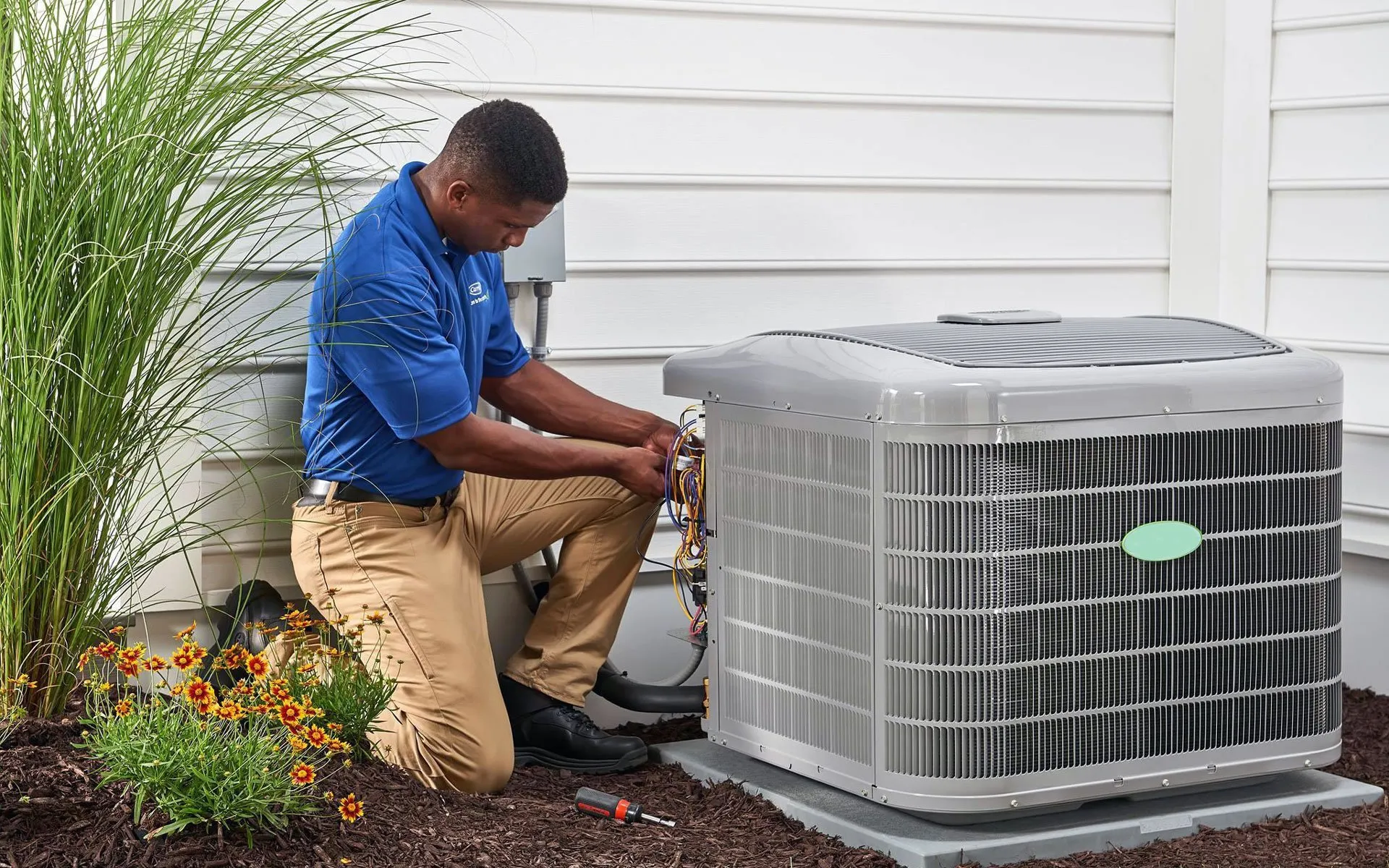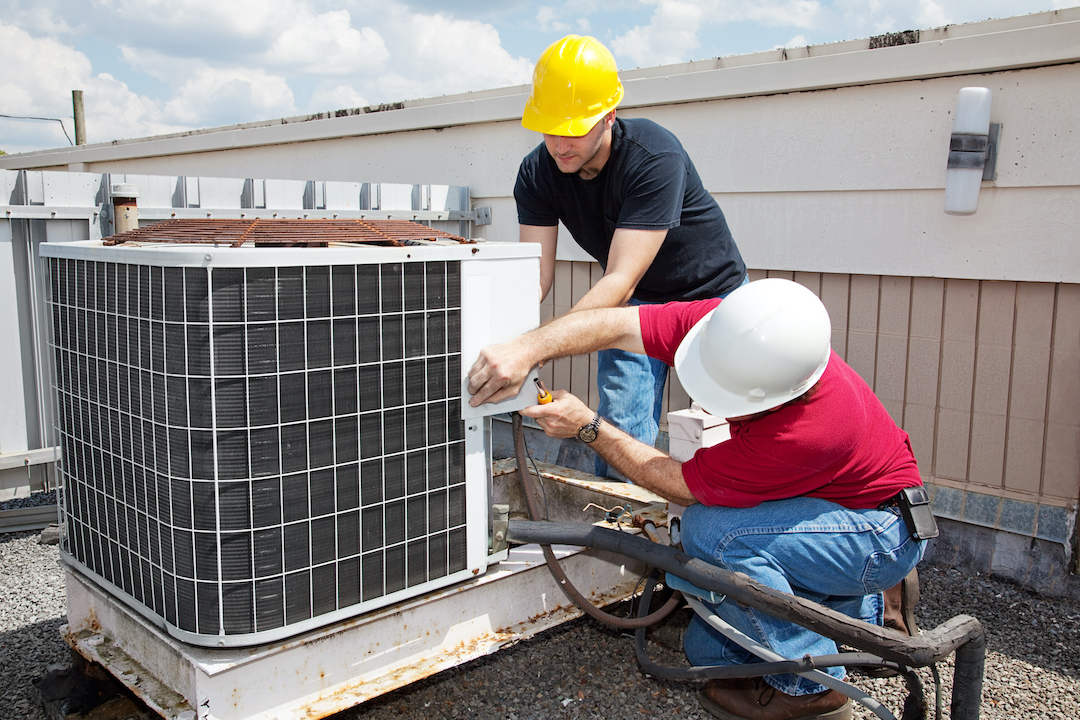Picking Between a Heatpump and Heating System: Secret Factors To Consider for Your Cooling And Heating Needs
When examining home heating alternatives for cooling and heating needs, the decision in between a heatpump and a furnace can be complex. Each system provides unique benefits tailored to certain climates and energy performance objectives. Comprehending these distinctions is essential for making an enlightened choice. Secret factors such as installation costs and environmental influence better complicate the option procedure. Which alternative absolutely aligns with one's convenience and sustainability preferences? The complying with areas will certainly explore these considerations in information.
Recognizing Warm Pumps: Just How They Function and Their Benefits
While lots of homeowners think about various home heating alternatives, recognizing exactly how heatpump feature and their advantages can greatly affect their choice. Heatpump run by moving heat instead than creating it. In the winter season, they draw out warm from the outside air or ground and transfer it indoors, while in the summer, they reverse this process, cooling the home by removing warmth outside. This double capability makes them versatile for year-round climate control.One of the primary benefits of warm pumps is their energy efficiency. They make use of substantially much less power contrasted to standard heater, potentially leading to lower utility expenses (heat pump replacement ooltewah tn). Furthermore, heatpump have a smaller carbon footprint, making them an environmentally pleasant selection. They also require much less maintenance than standard systems, contributing to long-lasting cost financial savings. In general, comprehending the technicians and advantages of warmth pumps can aid home owners make notified choices concerning their home heating and cooling needs
Exploring Furnaces: Kinds, Procedure, and Benefits
Heaters can be found in various kinds, consisting of gas, electrical, and oil designs, each with unique functional mechanisms. Comprehending these distinctions is crucial, as they influence effectiveness and home heating efficiency. Furthermore, heaters supply numerous advantages, such as regular warmth output and dependability in cooler environments.
Sorts of Heaters
Furnace can vary significantly in style and operation, with heating systems being a prominent selection among property owners. There are a number of kinds of furnaces, each using various gas resources and technologies. Gas furnaces are common, leveraging all-natural gas to create warmth efficiently. Electric heating systems, on the other hand, make use of electric resistance to create heat, often preferred for their uncomplicated installation. Oil heaters, while much less typical, are reliable in locations with minimal gas accessibility (heat pump replacement ooltewah tn). In addition, condensing furnaces make the most of energy effectiveness by capturing and recycling exhaust gases. Each kind operates through a system of warm exchangers and ductwork to disperse cozy air throughout a home. Recognizing the distinctions in between these furnace kinds is necessary for informed heating and cooling choices
Benefits of Heating systems
For property owners seeking trustworthy heat during chilly months, the benefits of furnaces are significant. Furnaces give constant heating, ensuring also temperature levels throughout the home. They are specifically reliable in extreme chilly, commonly surpassing heatpump in icy conditions. Different types, consisting of gas, electric, and oil heaters, use flexibility to fulfill diverse demands and preferences.Furnaces likewise tend to have lower preliminary installation prices contrasted to warmth pumps, making them a more obtainable choice for lots of. Their durable layout contributes to a longer life expectancy, with several systems lasting over 15 years with appropriate upkeep. In addition, modern furnaces are frequently equipped with innovative innovation for boosted effectiveness, which can cause minimized power bills. Overall, heating systems stay a trustworthy selection for effective home heating.

Energy Performance: Comparing Warm Pumps and Furnaces
When comparing power performance between heatpump and heaters, the Seasonal Power Effectiveness Proportion (SEER) plays a necessary duty in figuring out performance. In addition, a functional cost evaluation exposes the long-term economic ramifications of each system. Understanding these variables can direct property owners in making notified decisions regarding their home heating options.
Seasonal Energy Performance Ratio
Power effectiveness plays a crucial role in the decision-making process between warm pumps and furnaces, particularly when thinking about the Seasonal Energy Efficiency Proportion (SEER) This metric measures the cooling effectiveness of heat pumps over a whole cooling season, giving a standard way to review efficiency. Higher SEER ratings show higher energy performance, translating to lower power usage and lowered energy bills. In comparison, furnaces are typically analyzed utilizing the Yearly Gas Application Performance (AFUE) score, which reflects heating effectiveness. When contrasting these 2 systems, homeowners must focus on SEER ratings for heat pumps, as they directly influence overall energy financial savings and ecological sustainability. A comprehensive understanding of SEER can significantly affect the long-lasting complete satisfaction and cost-effectiveness of the picked a/c option.
Operational Expense Evaluation
Recognizing the operational costs associated with warm pumps and furnaces is crucial for homeowners evaluating their choices. Heat pumps commonly use higher energy effectiveness, transforming electric power into heat with marginal waste. This leads to reduced monthly energy expenses, especially in moderate environments. On the other hand, standard furnaces, specifically gas models, may have lower upfront costs yet can sustain greater operational costs in time as a result of fuel rates and efficiency ratings.Moreover, heatpump can function as both home heating and cooling down systems, possibly decreasing the demand for different cooling and heating devices. While initial investments for heatpump might be higher, their lasting financial savings in power performance can make them a much more economical selection for several houses. Mindful analysis of regional energy rates is important to figure out the check out this site very best alternative.
Installation Prices: What to Expect for Each Heating Unit
Installation expenses for home heating systems can vary considerably between heatpump and heating systems, affecting home owners' choices. Heatpump normally have higher in advance installation expenses, usually varying from $3,500 to $8,000, relying on the device dimension and complexity of installation. This consists of the outside system, interior handling system, and necessary ductwork modifications. On the other hand, heating systems have a tendency to have lower initial expenses, balancing in between $2,500 and $6,000, which can be appealing for budget-conscious house owners. Setup expenditures can raise if substantial ductwork is required.Moreover, the choice of fuel kind for furnaces-- all-natural gas, gas, or electrical-- can also affect installment costs. While heatpump offer power efficiency, their first investment may discourage some purchasers. Eventually, assessing setup expenses along with long-lasting cost savings and performance will certainly assist property owners in making educated decisions concerning their furnace.
Climate Factors To Consider: Which System Performs Better in Your Area
Just how do environment conditions affect the performance of heater? The performance of warmth pumps and heating systems can vary substantially relying on the regional environment. In modest environments, warmth pumps excel by successfully transferring heat from the outside air, making them an energy-saving choice. However, their efficiency reduces in very cool temperature levels, where they may have a hard time to remove adequate heat. On the other hand, heating systems, specifically gas versions, provide regular and dependable warmth no matter outside problems, making them preferable in chillier regions.In locations that experience milder winters months, heatpump can operate successfully year-round, supplying both heating & cooling. On the other hand, areas with severe wintertimes often gain from the effectiveness of heaters. Inevitably, comprehending the neighborhood environment is essential when determining between a heatpump and a heater, as it directly impacts their functional efficiency and overall efficiency.
Upkeep Demands: Long-Term Care for Warmth Pumps vs. Furnaces
While both heatpump and furnaces need routine upkeep to guarantee peak performance, their particular demands and care routines differ considerably. Heating systems generally require less frequent interest, with yearly inspections being sufficient to examine for gas leaks, tidy filters, and additional resources evaluate overall performance. Their simpler style usually permits uncomplicated repairs.In comparison, warm pumps require semiannual maintenance as a result of their dual function in heating and air conditioning. This consists of cleaning coils, examining cooling agent degrees, and guaranteeing that both the exterior and interior devices operate at their ideal. In addition, heatpump maintenance typically involves more intricate parts, making professional servicing essential.Neglecting upkeep can bring about reduced performance and increased energy costs for both systems. Ultimately, property owners ought to think about these lasting treatment demands when picking between a heat pump and a furnace, as positive upkeep can expand the life expectancy and efficiency of either system considerably.
Ecological Influence: Choosing a Lasting Home Heating Option
The ecological effect of heating unit is an important assessment for home owners looking for lasting alternatives. Heatpump are usually extra energy-efficient than standard heaters, as they move heat instead than create it, considerably lowering carbon emissions. By utilizing renewable resource sources, such as geothermal or air-source warm pumps, homeowners can better decrease their environmental footprint.On the other hand, gas heaters emit greenhouse gases and contribute to air contamination, though they typically supply higher warm result. However, improvements in innovation have actually brought about the advancement of high-efficiency heaters that reduce emissions.Ultimately, choosing a heater entails evaluating performance against environmental impact. Property owners are encouraged to review regional power resources and rewards for renewable systems, making certain a choice that straightens with both individual comfort and environmental duty. The choice influences not only instant comfort but also lasting sustainability and ecological wellness.
Often Asked Inquiries
For How Long Do Warm Pumps and Furnaces Generally Last?
The lifespan of heatpump normally ranges from 15 to twenty years, while heaters can last in between 15 to 30 years. Regular upkeep substantially affects their longevity and performance in supplying home heating remedies.
Can I Use a Heatpump in Incredibly Cold Climates?
Heatpump can operate in incredibly chilly environments, but their efficiency lessens as temperature levels decrease. In such conditions, extra heating sources might be essential to preserve comfy interior temperatures and assure peak efficiency.

What Is the Sound Level of Warmth Pumps Versus Furnaces?
The noise degrees of warmth pumps and heating systems differ substantially. Typically, heat pumps run even more quietly than typical furnaces, making them preferable for those delicate to sound, while furnaces might produce louder operational sounds throughout heating cycles.
Are Warm Pumps Suitable for Both Cooling And Heating?
Heatpump are without a doubt suitable for both heating & cooling (heat pump service). They work by transferring warmth, providing reliable temperature level control year-round, making them a functional option for homeowners important link seeking an all-in-one HVAC solution
What Size Heating System Do I Required for My Home?
Figuring out the appropriate dimension heating unit for a home requires reviewing aspects such as square video footage, insulation quality, neighborhood climate, and the home's format. Consulting a specialist can ensure an exact analysis and ideal comfort. Warm pumps usually offer greater energy efficiency, transforming electrical energy right into warmth with marginal waste. In modest environments, heat pumps succeed by efficiently transferring heat from the outdoors air, making them an energy-saving choice. Conversely, heating systems, especially gas versions, supply reliable and consistent warmth no matter of outdoor conditions, making them more effective in colder regions.In locations that experience milder winters months, heat pumps can run effectively year-round, giving both heating and air conditioning. Warm pumps are generally extra energy-efficient than traditional heaters, as they move heat rather than generate it, significantly reducing carbon exhausts. By utilizing sustainable energy resources, such as geothermal or air-source heat pumps, homeowners can even more minimize their environmental footprint.On the various other hand, natural gas heaters discharge greenhouse gases and add to air contamination, though they typically offer greater warm output.
Comments on “How to Extend HVAC Lifespan Through Consistent heat pump service”